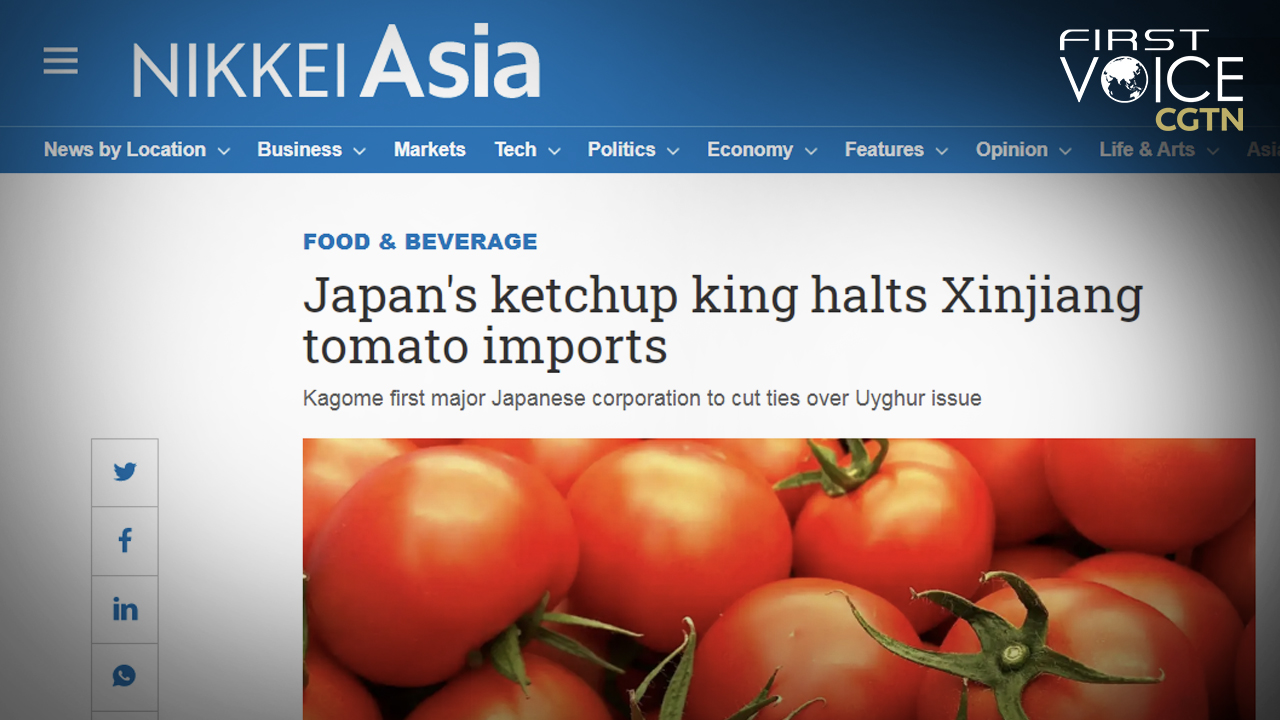
Editor's note: CGTN's First Voice provides instant commentary on breaking stories. The daily column clarifies emerging issues and better defines the news agenda, offering a Chinese perspective on the latest global events.
Japan's ketchup maker Kagome has become the latest company to admit it witnessed no human rights problems in Xinjiang Uygur Autonomous Region but boycotts the region anyway.
A Kagome spokesperson told Japan's Nikkei newspaper that the company regularly visits the factories and fields in Xinjiang and has "confirmed that the tomatoes used in the past were not produced in an environment that violated human rights."
Nonetheless, the company says that along with costs and quality, "human rights problems have become a factor in making decisions."
The Chinese mainland is reportedly responsible for only 0.4 percent of Kagome's sales. Xinjiang supplied only a tiny percentage of Kagome's tomatoes.
It's hard to know if the company boycotted Xinjiang tomatoes to avoid negative publicity or due to government pressure. But Kagome will pay only a small cost for its decision.
The same can't be said for other multinationals enmeshed in the shadowy new political game over Xinjiang. Brands like Nike and H&M that have stopped using cotton from Xinjiang are facing a ferocious backlash from Chinese consumers.
Similar to Kagome, they have offered no proof that any human rights abuses are taking place. In fact, the Better Cotton Initiative, which they relied on to make sure workers are treated fairly, in January 2020 told trade publication Apparel Insider that neither third-party audits nor its own investigations found "any evidence of incidences of forced labor on farms within [Better Cotton Initiative] programs."
This was confirmed again last month, when Better Cotton Initiative Shanghai branch head Wu Yan said, "In response to overseas claims about forced labor concerns in Xinjiang, we have repeatedly conducted stringent inspections, submitted two of our investigation reports and compiled years of reports from third-party visits. We have also repeatedly told international nongovernmental organizations as well as other stakeholders that we haven't identified one single case of forced labor."
Japanese retailers Uniqlo and Muji have also publicly stated that they have found no instances of human rights abuses in Xinjiang. They have a substantial presence in China and do not plan to leave the market or boycott Chinese cotton.
It's not hard to see what is going on. Companies are admitting there is no evidence of genocide or even forced labor. But amid the repeated unsubstantiated claims from their governments, and perhaps pressure from officials, they are steering clear of involvement in Xinjiang to avoid controversy if the cost to their bottom line is not too high.
By repeating the horrific charge of genocide over and over again, some Western officials are seeding an idea in people's minds that the Chinese government must be abusing the Uygur population in Xinjiang.
The term genocide rightly sends a chill down the spine of anyone who hears it. Of course, no one has seen any evidence of genocide anywhere in China.
Nonetheless, an average person will conclude that where there is smoke, there is fire, so there must be some sort of atrocities or abuse happening there.
This is the logic of repeating a bogus charge over and over again. And sadly, it is effective.

A cotton harvesting machine works in a field in Awat County, northwest China's Xinjiang Uygur Autonomous Region, October 24, 2019. /Xinhua
A cotton harvesting machine works in a field in Awat County, northwest China's Xinjiang Uygur Autonomous Region, October 24, 2019. /Xinhua
Take, for example, the drumbeat of claims by some officials in the George W. Bush administration that Iraq had weapons of mass destruction (WMD). Officials from Bush's own government leaked doubts about the claims to the media. Repeated inspections by the UN failed to find any trace of chemical or nuclear weapons. Despite a barrage of sinister-looking satellite photos and "firsthand" testimony from anti-Saddam expatriates, no substantial evidence was ever produced.
Nonetheless, the U.S. invaded Iraq on the pretext of a clear and present danger, cheered on by a compliant media and enthusiastic public. No weapons of destruction were ever found because the whole scenario was based on lies and cooked intelligence reports from the start.
A similar process is happening with Xinjiang right now. The BBC posts satellite photos of a nondescript building complex and says they prove genocide. Uygur expatriate groups whose purpose is to oppose the Chinese government provide "eyewitnesses" claiming unspeakable atrocities without offering any corroboration.
If real genocide were occurring, one would expect an outcry from company employees in the region. We would see lists of victims, vivid photographic evidence or some other concrete proof.
Instead, much like Iraq's weapons of mass destruction, or the supposed "cultural genocide" of Tibetan people that was alleged in the run-up to the 2008 Olympics, there will never be any concrete evidence. The claims are false and politically motivated.
China's economic policy in Xinjiang has helped the region to gain prosperity and raised residents' living standards.
Using supposed genocide and human rights abuses as a pretext and boycotting products like tomatoes or cotton are intended to harm the region's economy, thereby undermining China's efforts in combating terrorism in the region.
The lies also serve as a distraction to tarnish China's reputation, drain its energy and distract its focus on development – all in an effort to contain its rise.
Like the claims of weapons of mass destruction, this campaign of lies from overseas has the potential to do real damage to local people, starting with robbing them of their jobs.
Those who don't learn history are doomed to repeat it. Are companies doing business in China really happy to become involved in another WMD-style disinformation campaign led by the U.S.?
(If you want to contribute and have specific expertise, please contact us at opinions@cgtn.com.)

